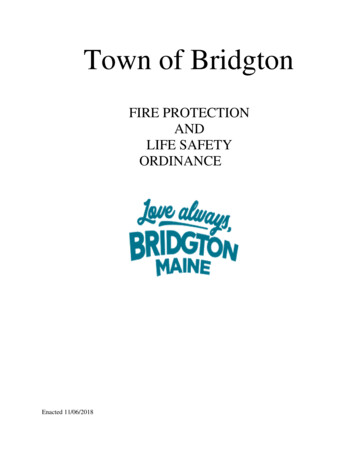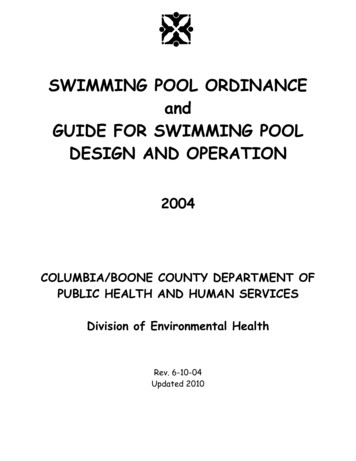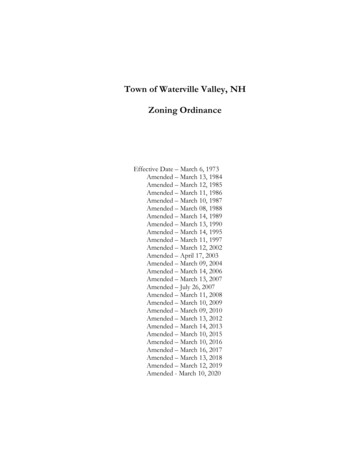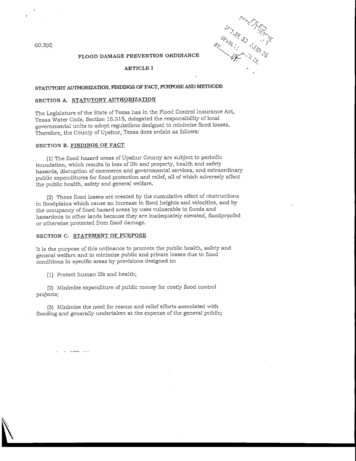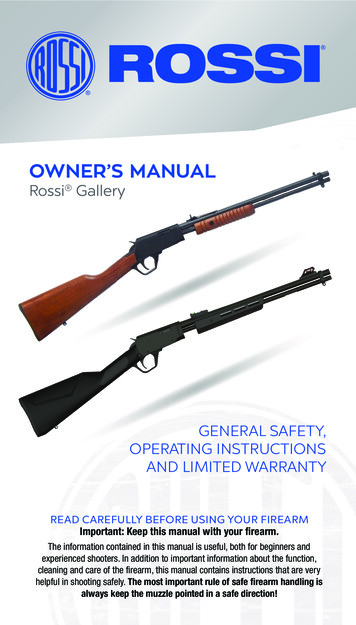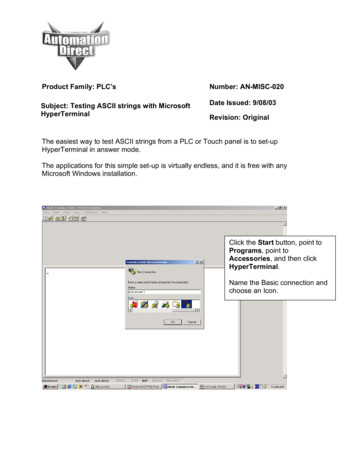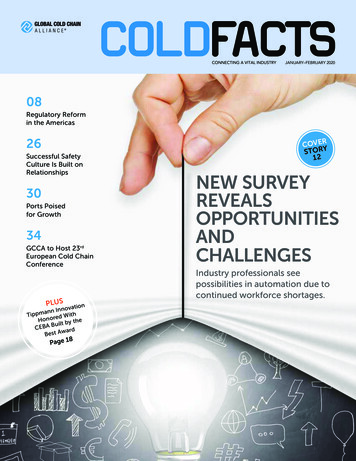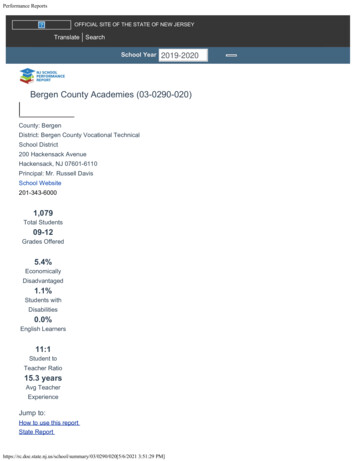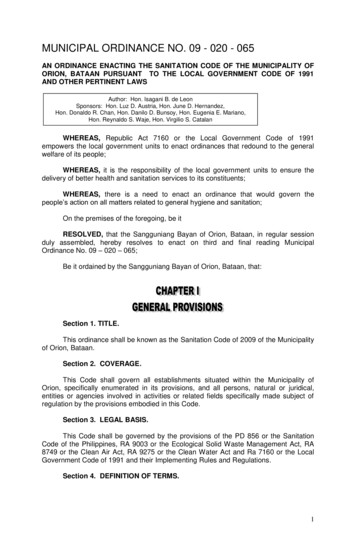
Transcription
MUNICIPAL ORDINANCE NO. 09 - 020 - 065AN ORDINANCE ENACTING THE SANITATION CODE OF THE MUNICIPALITY OFORION, BATAAN PURSUANT TO THE LOCAL GOVERNMENT CODE OF 1991AND OTHER PERTINENT LAWSAuthor: Hon. Isagani B. de LeonSponsors: Hon. Luz D. Austria, Hon. June D. Hernandez,Hon. Donaldo R. Chan, Hon. Danilo D. Bunsoy, Hon. Eugenia E. Mariano,Hon. Reynaldo S. Waje, Hon. Virgilio S. CatalanWHEREAS, Republic Act 7160 or the Local Government Code of 1991empowers the local government units to enact ordinances that redound to the generalwelfare of its people;WHEREAS, it is the responsibility of the local government units to ensure thedelivery of better health and sanitation services to its constituents;WHEREAS, there is a need to enact an ordinance that would govern thepeople’s action on all matters related to general hygiene and sanitation;On the premises of the foregoing, be itRESOLVED, that the Sangguniang Bayan of Orion, Bataan, in regular sessionduly assembled, hereby resolves to enact on third and final reading MunicipalOrdinance No. 09 – 020 – 065;Be it ordained by the Sangguniang Bayan of Orion, Bataan, that:Section 1. TITLE.This ordinance shall be known as the Sanitation Code of 2009 of the Municipalityof Orion, Bataan.Section 2. COVERAGE.This Code shall govern all establishments situated within the Municipality ofOrion, specifically enumerated in its provisions, and all persons, natural or juridical,entities or agencies involved in activities or related fields specifically made subject ofregulation by the provisions embodied in this Code.Section 3. LEGAL BASIS.This Code shall be governed by the provisions of the PD 856 or the SanitationCode of the Philippines, RA 9003 or the Ecological Solid Waste Management Act, RA8749 or the Clean Air Act, RA 9275 or the Clean Water Act and Ra 7160 or the LocalGovernment Code of 1991 and their Implementing Rules and Regulations.Section 4. DEFINITION OF TERMS.1
Words and phrases used in this Code shall be understood in the sense 4.15.16.Abattoir or Slaughterhouse – the premise approved and registered by theregulatory authority used in the slaughter of animals for humanconsumption;Accessory Building – a detached building or structure in a secondary orsubordinate capacity from the main or principal building on the samepremises;Additional Construction in an Establishment – extension of any structuresor rooms in an establishment which requires additional sanitation facilitiesand amenities.Adulterated Food – food that contains any poisonous or deleterioussubstances in a quantity which may render it injurious to health, or hasbeen processed, prepared, packed or held under in sanitary conditions,where valuable nutrients have been in part or in whole omitted thereof;Aisles or Passageway – a space between rows of stalls inside the marketutilized as passage by the public;Ambulant Peddler – one who sells his wares, commodities or foodstuffs inany place of the market and keeps on traveling and selling his goods fromone place to another;Apartel – a cottage or unit with one or more rooms distinctly different froma hotel room in such a way that cooking is allowed inside and thatcomplete facilities for such are provided.Apartment House – a building containing a number of separate residentialsuites.Appliance – includes the whole or part of any utensil, machinery,instrument, apparatus, or article used or intended for use in or for making,keeping/storing, preparing or supplying of any food;Article of Bedding – includes upholstered furniture and filling materials andany mattress, pillow, cushion, quilt, bed pad, comforter, upholstered springbed, box-spring davenport or day bed, metal couch, metal bed, metal cot,metal cradle, used for sleeping, resting or reclining purposes and anyglider, hammock or other substantially similar article which is upholsteredin whole or in part.Bakery, Bake House, Cake Kitchen or Shop and Similar Establishments –any premises in which breads, pastries, cakes, savories, or other bakerssmall goods are baked or cooked for sale and any portion of suchpremises used for storage of yeast, flour or other ingredients, of used forthe kneading or working with dough;Bathroom – a room with toilet and bathing facilities;Boarding House – a building where selected persons for fixed period oftime are supplied with and charged for sleeping accommodations and/ormeals. This will include dormitories and other similar establishments.Carcass – all parts including viscera of slaughtered cattle, sheep, goats orswine that may be used for human consumption;Caterer – any person, firm or corporation maintaining or operating akitchen or any similar establishment for the preparation, purveying,cooking or processing of food or drink for sale or hired to serve to personselsewhere;Chemical Waste – comprises of discarded solid, liquid and gaseouschemicals. Chemical waste may be hazardous or non-hazardous. It isconsidered hazardous if it is toxic, corrosive (acids of pH 2 and bases ofpH 12), flammable, reactive (explosive, water reactive, shock sensitive),or genotoxic (carcinogenic, mutagenic, teratogenic, or otherwise capableof altering genetic material). It is non-hazardous if it consists of chemicalsother than those describe above.2
.34.Commercial Laundry – a type of laundry utilizing mechanized equipment,specialized facilities, and trained personnel to perform the operation. Theservice is charged with a fee. There are several types of commerciallaundry depending on its specialization.Condominium – a building with one or more storey composed of multi-unitresidential suites under the joint ownership of occupants, each unitprovided with complete sanitary facilities, utilities and other amenities.Contamination – the presence of infectious or non-infectious agent in aninanimate article or substance;Dairies – establishments for the production, sale or distribution of milk ormilk products such as butter or cheese;Detergent – any of the various surface-active agents used in removing dirtor other foreign matter from soiled surfaces such as clothes and linensand retaining it in suspension.Diaper Supply – a type of laundry which exclusively supplies clean diapersfor babies. The customers may own the diapers and use the service forlaundering or rent the diapers along with the service.Dry Cleaning – a process of removing dirt and stains from linens, leathers,fabrics and furs using liquid solvents other than water.Egress – an arrangement of facilities to assure a safe means of exit from abuilding;Establishment – a collective term construed to include hotel, apartel,motel, boarding house, tenement house, apartment house, dormitory, inn,lodge, condominium and other similar establishments;Food – any raw, cooked or processed edible substances, beverages oringredient used or intended for use or for sale in whole or in part forhuman consumption;Food Cart – a non-enclosed, movable food stand, with or without wheels,selling take-out foods and/or drinks such as bread, pastries, cakes, bottledor canned drinks or in mechanical dispensers, and usually located in thefast food areas of malls, atriums, shopping complex or multi-purposeestablishments;Food Establishment – an establishment where food or drinks aremanufactured, processed, stored, sold or served, including those that arelocated in vessels;Food Establishment Operator – any person who by ownership or contractagreement is responsible for the management of one or more foodestablishments;Food Handler – any person, who directly handles, stores, prepares,serves and/or sells food, drinks or ice and who, in the process, comes incontact with any eating or cooking utensils and food vending machines;Food Manufacturing – any activity pertaining to the processing and/ormaking of foods or drinks, such as that undertaken by bakeries or bakeshops, processed meat plants, soft drink or fruit drink companies;Food Stall – a permanently constructed food both with partition walls,dividers or equivalent, with food showcases and food displays, counters,with or without kitchen, selling cooked meals or snack foods and usuallyfound in fast food areas of multi-purpose establishments. They aresometimes referred to as self-service restaurants;Food Service Establishment – any food establishment serving food ordrinks that may or may not have been prepared elsewhere, such as coffeeshops, canteen, panciteria, carinderia, fast food, refreshment parlor, snackbar, night clubs and other similar establishments found in hospitals,schools, office buildings and the like;Foot Candle – a unit of illumination on a surface that is everywhere onefoot from a uniform source of light of one candle and equal to one lumenper square foot. One foot candle is equal to 10.76 lux.3
.52.53.54.55.Function Room – a room in a hotel or other similar establishments rentedfor public or social ceremonies or gathering or festivities or other forms ofentertainment.Furniture – movable items used in all establishments, such as tables,chairs and benches;Garbage Depository – a temporary disposal point for refuse before beingcollected for final disposal;Grocery – where staple food articles commonly called “groceries” arehandled and sold;Guest – the occupant of a hotel/motel and other boarding and lodgingrooms.Health Certificate – a certification in writing, using the prescribed form, andissued by the municipal or city health officer to a person after passing therequired physical and medical examinations and immunizations;Heated Water – water heated to a temperature of not less than 49ºC(120ºF) at the outlet.Homeowner – any owner, lessee or any person who is residing in oroccupant of and/or who holds any title or interest in a real propertyclassified as residential or used as a dwelling place;Hotel – a building, edifice or premises or a completely independent partthereof, which is used for the regular reception of transient guests,accommodation or lodging of travelers and tourists, and the provisions ofservices incidental thereto for a fee;Infestation – the presence within or around a building of any insect, rodentor other pests;Laboratory – an accredited facility equipped with testing equipment andmaterials that is duly authorized and accredited to perform any or specifictest or examinations;Laundromat – a type of neighborhood laundry establishments, whichprovides coin-operated washing machines, dryers and other laundryfacilities.Lettable Room – any room or rooms in an establishments intended for theuse or occupancy of any of its guest for a fee;Linen – includes sheets, tablecloths, and other similar materials;Linen Supply – a type of laundry which supplies uniforms and other linensto such customers as offices, restaurants, hotels, motels, manufacturingplants, automotive shops, and hospitals, It also supplies linens such asshop towels, dust mops, dust rags, and other dust control items used inindustry and other businesses.Lobby – a foyer or an anteroom or a waiting room furnished with lounges,chairs or sofas where guests can register;Local Environmental Compliance Certificate – a document issued by theDepartment of Environment & Natural Resources (DENR) certifying thatbased on the representation of the project proponent, as reviewed andvalidated by the appropriate agency, the proposed project or undertakingwill not cause a significant negative environmental impact and theproponent has complied with all the requirements;Local Government Unit – the local political subdivision which refers to theprovince, city, municipality or barangay;Local Health Authority (LHA) – any official or employee responsible for theapplication of a prescribed health measure in a local political subdivision.For the municipal level, the local health authority is the MunicipalMayor.Local Health Officer – the Municipal Health Officer;Lodging House – a building where persons are supplied with and chargedfor sleeping accommodations only. This will include inn, lodge, cabin,cottage, resort, spa, cabaña, club, pension house, hostel and all other4
.73.74.75.76.similar establishments not classified as hotel by the Department ofTourism;Market – a public place where commodities as foodstuffs, wares, etc., maybe bought or sold;Market Administrator or Master – a representative of the Municipal Mayor,who acts as the officer-in-charge of the market where he is assigned. Hehas direct supervision over the employees of the market.Meat – the edible part of the muscle of cattle, sheep, goats or swine whichis skeletal or which is found in the tongues, in the diaphragm, in the heartor in the esophagus, with or without the accompanying or overlying fat,and the portions of bones, skin nerve and blood vessels which normallyaccompany the muscle tissue and which are not separated from it in theprocess of dressing;Meat by-product – any edible part other than meat which has been derivedfrom cattle, sheep, goat, or swine whether boned or boneless and whetherground or underground to which no other ingredient has been added;Misbranding – indicates all possible conditions of fraud, mislabeling,imitation or misrepresentation of food products;Motel – a roadside hotel consisting of private cabins usually intended formotorists.Municipality – the Municipality of Orion, Bataan;Night Club – establishment open during the night usually serving liquorand food, providing entertainment or music and space for dancing;Permissible Occupancy – the maximum number of individuals permitted tostay in a hotel/motel room or similar establishment room.Piggery Farms – any parcel of land devoted to raising or breeding ofpigs/swine;Plucking – dressing of poultry animals;Poultry – domestic fowls collectively;Poultry Farms – plot of land devoted to the raising of domesticated fowlswhich serve as sources of eggs and meat for human consumption;Privacy – the existence of conditions in hotels and other similarestablishments which will permit its guest to carry out an activity withoutinterruption and/or interference either by light or sound.Public Laundry – a laundry established and operated for, and opens to thepublic and/or to an exclusive clientele.Public Market – a place designated by the Municipal Government wheredry and wet goods and commodities, perishable and non-perishable, aresold;Offal – part of internal organs of a slaughtered animal;Readily Perishable Food – any food of such type or in such condition asmay be spoil and which consists in whole or in part of meat, poultry, fish,shellfish, milk or milk products, eggs or other ingredients capable ofsupporting the progressive growth or micro-organisms which can causefood infection or food intoxication. This does not include products inhermetically sealed containers processed by heat to prevent spoilage, anddehydrated, dried or powdered products so low in moisture content as toproduce development of micro-organisms;Refuse – term for all solid waste products;Restaurant – coffee shops, canteens, panciteria, bistro, carinderia, fastfood, refreshment parlors, cafeteria, snack bars, cocktail lounge, bars,disco, night club, food kitchen caterer’s premises and all other eating ordrinking establishments in which food or drink is prepared for saleelsewhere or as part of a service of a hospital, hotel, motel, boardinghouse, institution caring for people and other similar establishments;Room Service – any service or thing supplied and delivered to the guestrooms such as food, drinks, sundries, etc.5
.94.95.96.Safety – the condition of being free from danger and hazards which maycause injuries or diseases.Sanitation Inspector – an officer employed by the national, provincial, cityor municipal government, who enforces sanitary rules, laws andregulations and implements environmental sanitation activities;Sanitary Engineer – a person duly registered with the Board of Examinersfor Sanitary Engineers (RA 1364) and who heads the sanitation division orsection or unit of the provincial/city/municipal health office or employedwith the Department of Health or its regional field health units;Sanitary Permit – the certification in writing of the city or municipal healthofficer or sanitary engineer that the establishment complies with theexisting minimum sanitation requirements upon evaluation or inspectionconducted in accordance with Presidential Decrees No. 522 and 856 andlocal ordinances;Sanitize – an effective bactericidal treatment to render surfaces of utensilsand equipment free of pathogenic microorganisms;Sari-Sari Store – a convenient store where a variety of food and foodmaterials and other household merchandise are sold in small scale;Scalding – cleaning and removal of hides, feather or hair accompaniedwith boiling water or steam;Secretary – the Secretary of Health;Sectioning or Zoning – grouping together in one section or zone in themarket the same or similar commodities, goods or foodstuffs offered forsale;Single Service Articles – straws, cups, toothpick, chopsticks, containers,lids or closure, plates, knives forks, spoons, stirrers, paddles, placemats,napkins, doilies, wrapping and packaging materials and all other similararticles which are made wholly or in part from paper, paperboard, moldedpulp, foil, wood, synthetic, and other readily destructible materials whichare intended to be discarded after use;Soil – visible dirt or debris such as organic matters, organic substanceswhich may protect harbor or assist the growth of microorganism.Solid Waste/Refuse – all organic or inorganic non-liquid and non-gaseousportions of the total waste mass. It consists of all putrescible and nonputrescible solid materials except for body waste.Solid Waste Management – an integrated system, approach or process onthe generation, segregation, storage, collection, transport, processing,recycling, recovery and final disposal or containment of solid waste.Solvent – a common term of liquid substance used in dry cleaning processin place of water.Stall – an open compartment of area designated for the sale or display ofcommodities, including food products;Stallholder – one who has been granted the right to use a stall or more,where he can display or sell his goods, commodities or foodstuffs;Sterilization – any chemical or physical process which kills and destroysall microorganisms.Tenement House – a building or portion thereof which is leased or sold toan occupant as residence by a number of families but living independentlyof one another and having a common right in the use of halls, stairways,terraces, verandas, toilets and baths.Tonsorial and Beauty Establishment – includes barber shops, beautyparlors and other establishments engaged in the physical make-over of anindividual;Utensils and Equipment – any kitchenware, tableware, glassware, cutlery,containers, stoves, sinks, dishwashing machines, tables, meat blocks andother equipment used in the storage, preparation, distribution or serving offood;6
97.98.99.100.Vendor – any person who sells goods, commodities or foodstuffs, etc;Vermin – a group of insects or small animals such as flies, mosquitoes,cockroaches, lice, bedbugs, mice and rats which are vectors of diseases;Viscera – soft interior part of the body;Water Refilling Station – establishment that refills and/or sells potablewater to the public;Section 5. No person shall be employed in any food establishments, foodmanufacturing, water refilling stations, beauty parlors, barbershops, medical and dentalclinics, funeral parlors, resorts and other establishments situated in the Municipality ofOrion and covered by regulations under this Code without securing first a HealthCertificate from the Municipal Health Office.Section 6. Applicants for Health Certificates as required in this Code shallundergo the following tests and radiologic examination and submit the original results ofthe tests to the Municipal Health Office:FecalysisUrinalysisComplete Blood CountChest X-rayHepa ProfileFood Handlers are likewise required to undergo Hepatitis A and TyphoidVaccines while Non Food Handlers are required to undergo Hepatitis B Vaccine.Results of the laboratory tests shall not be dated more than a week old whenpresenting the same to the Municipal Health Office for the issuance of health certificate.Section 7. All applicants for Health Certificate shall attend a Health andSanitation Seminar to be conducted by the Municipal Health Office.Section 8. All applicants for health certificate may elect to undertake thelaboratory tests and radiologic examinations required under Section 6 hereof in anyreputable laboratory or at the Municipal Health Laboratory.Section 9. The Health Certificate shall be valid until the end of the current yearand shall be renewed every year.Section 10. Health certificates are non-transferable.7
Section 11. SCOPE. The subsequent sections shall apply to all foodestablishments, food manufacturers and facilities including those located in vessels,food containers and vehicles, and food sold in the streets.Section 12. SANITATION REQUIREMENTS FOR OPERATING A FOODESTABLISHMENT.No person or entity shall operate a food establishment for public patronagewithout securing a Sanitary Permit.Section 13. APPLICATION OR RENEWAL OF SANITARY PERMIT.1.2.The application or renewal of Sanitary Permit shall be filed with theMunicipal Health Office.Sanitary Permit shall be issued only upon compliance to at least asatisfactory rating and existing sanitation standards for foodestablishments.Section 14. SANITARY PERMIT FEES.Fees shall be paid upon application, renewal and noting of sanitary permits. Theamount of fees shall be set through municipal ordinance.Section 15. NOTING OF PERMIT.Within 14 days after any change in the ownership or occupancy of any foodestablishment, the new occupant shall apply to the Municipal Health Office to have suchchange noted in the records and permit certificate which he shall produce for thepurpose and shall pay the corresponding fee in respect of such noting.Section 16. VALIDITY OF SANITARY PERMIT.The permit shall be valid for one (1) year, ending on the last day of December ofeach year, and shall be renewed every year. However, for new food establishments, thevalidity of the Sanitary Permit will also expire at the end of December of the currentyear.Upon the recommendation of the Municipal Health Officer, the Sanitary Permitmay be suspended or revoked by the Municipal Mayor upon violation of any sanitationrules and regulations.Section 17. POSTING OF SANITARY PERMIT.The Sanitary Permit shall be displayed in a conspicuous place in the foodestablishment, food manufacturing establishment and public market at all times andshall be available for inspection by health and other regulatory personnel. Every stallowner in the public market shall secure individual Sanitary Permits.Section 18. RECORD OF PERMIT CERTIFICATES.The Municipal Health Office shall keep a record of all establishments in respectof which permits have been issued and all permit certificates and renewal thereof.The record shall, in every case, show the following.i.The name and address of the holder of the sanitary permit who in every caseshall be the actual occupier of the establishment.8
ii.iii.iv.v.The location of the establishment;The purpose or purposes for which the permit has been issued;The date the first permit was issued and the dates of any renewal thereof;Every change of occupation and management of an establishment since thefirst permit was issued;vi. Conditions under which the permit was issued or any renewal thereofgranted; andThe record shall be available at all reasonable times for inspection by any officerof the Department of Health or Municipal Health Office.Section 19. HEALTH REQUIREMENTS FOR FOOD HANDLERS.Food handlers shall observed good personal hygiene and practices such as:1. Wearing clean working garments and hair restrain;2. Washing hands, arms and fingernails before working. Such washing must berepeated during working hours and after smoking, visiting the toilet, coughingor sneezing into hands, or as often as may be necessary to remove dirt andcontaminants;3. Cooks/Bakers shall wear clean working garments and should havehairnets/hair restraints, caps and aprons.4. No food handler with long fingernails or with manicured fingernails shall beallowed to work.5. Using chewing or smoking tobacco in any form while engaged in foodpreparation or service, or while in the equipment and utensils washing or foodpreparation areas is not allowed.6. No person shall be allowed to work in food handling and preparation whileafflicted with a communicable disease or a carrier of such disease, whichincludes boil or inflicted wounds, colds or respiratory infection, diarrhea orgastrointestinal upsets, and other related illnesses.7. The manager or person-in-charge of the establishment shall notify theMunicipal Health Officer or the company physician if any, when any employeeis known to have a noticeable disease.Section 20. QUALITY AND PROTECTION OF FOOD.All foods must be obtained from sources approved by the Municipal Mayor. Inthis regard, the following requirements are applicable:1. All meats shall come from duly licensed slaughterhouses inspected andapproved by the veterinarian or the regulatory authority. Processing of meatproducts shall be done as per existing regulations and in an approvedmanner.2. All livestock products sold or used in any food establishment, foodmanufacturing or public market shall bear the stamp of inspection by anauthorized abattoir.3. Injection of water and/or formaldehyde (formalin) and/or application ofcoloring agents to fresh or frozen livestock and poultry products are strictlyprohibited.4. Fish, shrimps, prawns, shellfish, seaweeds, and other sea foods, brackishwater foods, surface water foods and foods from aquaculture farms or pondsshall not come from sources in any manner polluted by sewage, chemicals,radioactive waste and other toxic substances.5. Vegetables and fruits shall come from safe sources where the soil is notcontaminated by night soil, sewage and toxic chemicals.9
6. No meat products, fish, vegetables and other food shall be procured fromsources or areas known to have been affected by radioactivity as forexample, areas contaminated with large amount of radioactive fallout.7. All milk and milk products shall come from approved sources and shall meetthe standards and quality established by the regulatory authority.Section 21. TRANSPORTING OF FOOD AND FOOD MATERIALS.1. All food and food materials shall be transported in sanitary transportingfacilities inspected and approved by the Municipal Health Officer. In thetransport of food, all food shall be in covered containers, wrapped or packed,so as to be protected from contamination. All readily perishable foods shall bekept at 7ºC (45ºF) or below; or 60ºC (140ºF) or above during transport, as thecase maybe.2. Readily perishable food and food materials transferred to another town, city,province or region in commercial quantity or intended for public consumptionshall be accompanied by a Transfer Permit issued by the Municipal HealthOfficer. Fees for the issuance of the certificate shall be set through amunicipal ordinance.3. Exporting and importing of food and food materials shall be covered byexisting regulations of the Food and Drugs Administration (FDA) and otherregulatory agencies.Section 22. PREPARATION, STORING AND SERVING OF FOOD/DRINK.1. All food while being displayed, stored, prepared, served or sold shall beprotected from contamination such as dust, flies, rodents and other vermins.2. All meats, fish, shellfish, shrimps, prawn and other sea, brackish water,surface water or aquaculture food products shall be properly washed beforebeing cooked or served.3. Suitable utensils shall be provided and used to minimize handling of food atall points where food is prepared.4. Fruits, vegetables, seaweeds, etc. used for salads should be fresh and freefrom bruises, dirt and shall be prepared with a minimum hand contact and onsurfaces and with utensils which have been sanitized prior to its usage.5. Milk should be stored in a refrigerator. Canned or packaged milk, other thandry milk powders shall be refrigerated after the container has been opened.6. All readily perishable foods shall be stored at 7ºC (45ºF) or below.7. Food to be served cold shall be kept at a temperature below 7ºC (45ºF).8. Cooked food intended to be served hot shall be kept at a temperature notlower than 60ºC (140ºF) and if possible be placed over hot conveyor or foodwarmer to keep it hot.9. Raw fruits and vegetables shall be thoroughly washed with disinfectingsolution if necessary before they are used and cooked.10. Tongs, forks, spoons, spatulas, scoops, chopping boards and other suitableutensils shall be provided and used by the employees to reduce hand contactwith food to a minimum.11. Cracked/chipped glasses, cups should be discarded.Section 23. All food establishments and food manufacturers are required to useiodized salt in their food preparation in accordance with Municipal Ordinance No. 02 –020 – 031.10
Section 24. All food establishments shall undergo monthly bacteriology testingof their ice and water supply.Section 25. The ice supply of food establishments must come from ice plantswith Sanitary Permits. Ice plants are subject to the requirements for water facilities.Section 26. The following are requirements for the issuance of a Sanitary Permitfor food establishments and food manufacturers:Vermin abatement programReceipt for payments of Sanitary Permit FeeBacteriological Examination of water sourceSection 27. No animals are allowed inside food establishments, except bomb –sniffing dogs or K9 on service or on duty.Section 28. Smoking cigarettes is strictly prohibited in all enclosed
This Code shall be governed by the provisions of the PD 856 or the Sanitation Code of the Philippines, RA 9003 or the Ecological Solid Waste Management Act, RA 8749 or the Clean Air Act, RA 9275 or the Clean Water Act and Ra 7160 or the Local Government Code of 1991 and their Implementi
